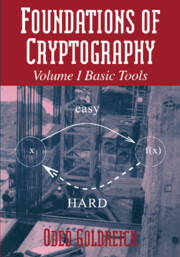3 - Pseudorandom Generators
Published online by Cambridge University Press: 10 December 2009
Summary
In this chapter we discuss pseudorandom generators. Loosely speaking, these are efficient deterministic programs that expand short, randomly selected seeds into much longer “pseudorandom” bit sequences (see illustration in Figure 3.1). Pseudorandom sequences are defined as computationally indistinguishable from truly random sequences by efficient algorithms. Hence the notion of computational indistinguishability (i.e., indistinguishability by efficient procedures) plays a pivotal role in our discussion. Furthermore, the notion of computational indistinguishability plays a key role also in subsequent chapters, in particular in the discussions of secure encryption, zero-knowledge proofs, and cryptographic protocols.
The theory of pseudorandomness is also applied to functions, resulting in the notion of pseudorandom functions, which is a useful tool for many cryptographic applications.
In addition to definitions of pseudorandom distributions, pseudorandom generators, and pseudorandom functions, this chapter contains constructions of pseudorandom generators (and pseudorandom functions) based on various types of one-way functions. In particular, very simple and efficient pseudorandom generators are constructed based on the existence of one-way permutations. We highlight the hybrid technique, which plays a central role in many of the proofs. (For the first use and further discussion of this technique, see Section 3.2.3.)
Organization. Basic discussions, definitions, and constructions of pseudorandom generators appear in Sections 3.1–3.4: We start with a motivating discussion (Section 3.1), proceed with a general definition of computational indistinguishability (Section 3.2) next present and discuss definitions of pseudorandom generators (Section 3.3), and finally present some simple constructions (Section 3.4). More general constructions are discussed in Section 3.5.
- Type
- Chapter
- Information
- Foundations of Cryptography , pp. 101 - 183Publisher: Cambridge University PressPrint publication year: 2001



